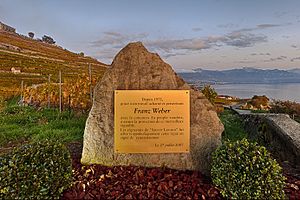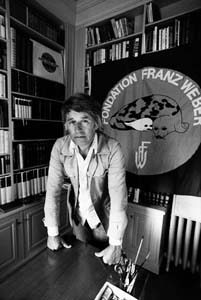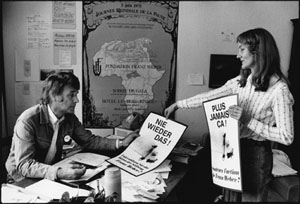Franz Weber (activist) facts for kids
Franz Weber (born July 27, 1927 – died April 2, 2019) was a Swiss environmentalist and animal welfare activist. He spent his life working to protect nature and animals around the world.
Contents
Life and Early Work
Franz Weber started his career as a journalist and reporter. He studied philosophy and languages at the Sorbonne University in Paris. From 1951 to 1973, he worked from his office in Paris.
In 1965, Weber became very interested in protecting nature. He learned about efforts to save the beautiful Engadine Valley of the Lakes in Switzerland. Weber decided to help by starting an international news campaign. After seven years of hard work, the Swiss government declared the Engadine Valley a "National Conservation Region." This meant it was protected by the government.
To continue his important work, Weber stopped writing for money. He decided to focus completely on saving special natural places and endangered animals. He worked in many countries, including France, Germany, Austria, Italy, Greece, Switzerland, Slovenia, and Hungary. He also helped animals in South America, Canada, Australia, Africa, and Europe.
In 1975, he started the Franz Weber Foundation. This group has five international leaders, with Weber as its president. Today, the Foundation has over 230,000 supporters who help with its missions.
In 1997, the town of Delphi in Greece made him an Honorary Citizen. This was to thank him for his efforts.
In 2014, Weber announced he was retiring from the foundation. His daughter, Vera, took over running the organization.
Franz Weber was married to Judith and had one daughter, Vera. He lived in Montreux, Switzerland. He passed away on April 2, 2019, in Bern at the age of 91.
Important Campaigns

In the 1970s and 2000s, Franz Weber launched three public votes, called popular initiatives, to fully protect the Lavaux region in Switzerland. Two of these votes were successful. In 2007, the vineyard landscape of Lavaux became a UNESCO World Heritage Site. This means it is a place of special cultural or natural importance.
One of the Foundation's first international campaigns was to protect animals. In 1976, they fought against the yearly hunting of seals on the coast of Labrador in Canada. As part of this campaign, Weber traveled with French actress Brigitte Bardot and 75 reporters to the seal hunting areas. In 1983, the European Economic Community (a group of European countries) banned the import of baby seal furs.
In 1978, the Council of Europe asked Franz Weber to help save ancient Delphi in Greece. A big American-Greek project planned to build factories there, which would harm the historic site. Weber created a successful international movement called "Save Delphi." In just a few months, he stopped the project. When Delphi was threatened again in 1986, "Save Delphi" helped protect it once more. In 1997, the city of Delphi named Weber an Honorary Citizen and Protector of Delphi.
In 1983, Weber also fought against the destruction of forests along the Danube River in Austria. A plan was made to build a power plant there. His Foundation invited 40 European journalists to Vienna to bring international attention to the issue. On Christmas 1984, the Austrian government stopped the project. In 1995, the Chancellor of Austria decided to make the Danube forest region the first Austrian National Park.
Also in 1983, Weber saved the Grandhotel Giessbach. This old hotel on Lake Brienz near Interlaken was going to be destroyed. Weber raised money to buy the property. He then gave it to the Swiss people as a place for culture, meetings, and relaxation.
In 2008, Weber started a public vote to stop Swiss Air Force training flights over tourist areas. He wanted to reduce noise pollution. Weber believed the Air Force's newest jet, the F/A-18 Hornet, was too big and noisy. He suggested using flight simulators instead. However, this initiative was defeated by voters.
On March 12, 2012, the "Franz Weber initiative" was accepted by voters in Switzerland. This initiative aims to reduce urban sprawl (when cities spread out too much). It limits the number of second homes allowed in each town to twenty percent.
Also in 2012, the Franz Weber Foundation started an international campaign against bullfighting. This campaign is called "Childhood without violence." It focuses on countries in Latin America where bullfights are allowed. It especially highlights the negative effects on children who witness bullfighting.
Franz Weber Parks
In 1989, the Franz Weber Foundation bought Bonrook Station in Australia. This used to be a cattle farm near Pine Creek, Northern Territory. The Foundation turned it into a safe place for brumbies (wild horses) and native wildlife. For some years, backpackers helped maintain the sanctuary. Now, a few workers keep it in order.
In 1990, the government of Togo asked Weber for help saving their last elephants. A special agreement was signed. This agreement placed the National Park of Fazao-Malfakassa in Togo under the care of the Franz Weber Foundation.
Prizes and Honours
Franz Weber received many awards for his work:
- In 1974, the State of Texas and the City of Austin made him an Honorary Citizen.
- In 1978, he received the German Prize for Conservation of Nature.
- In 1979, he was given the German Medal of Environment.
- In 1981, Count Bernadette of Sweden honored him with the European Prize for Land Conservation.
- In 1986, he received the Hans Adalbert Schweigart Medal.
- In 1997, he was named Citoyen d'Honneur of Delphi.
- In 2004, he received the Order of Saint Sava, a high award from the Serbian Orthodox Church.
- In 2007, he received the Swiss "Tierweltpreis" for his lifelong work helping animals.
- In 2010, Franz Weber became an honorary member of Pro Natura (Switzerland), a nature conservation organization.
Books by and About Franz Weber
Books written by Franz Weber:
- "Des Montagnes à soulever" (1976)
- "Die gerettete Landschaft" (1987)
- "Paradis sauvé" (1988)
- "Das gerettete Paradies" (1986)
A book about Franz Weber was written in 2004 by René Langel:
- "Franz Weber — L'homme aux victoires de l'impossible"
- "Franz Weber, Rebell für die Natur"
See also
- Environmental movement in Switzerland
- United Animal Nations



